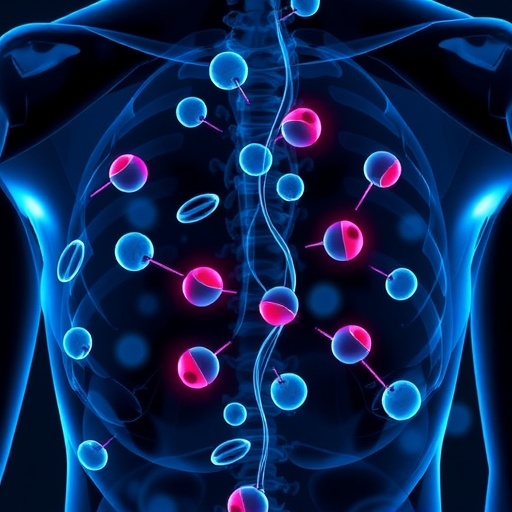In the evolving landscape of oncology, the intricate interactions between oncogenic pathways are gaining unprecedented attention. At the forefront of this research is emerging evidence that illustrates the reciprocal regulation mechanisms between key players in prostate cancer. A recent study authored by Sooreshjani, Kamra, Zoubeidi and others, elucidates the dynamic interplay of the NKX3.1 and AURKA signaling axes, particularly within the context of castration-resistant prostate cancer and neuroendocrine prostate cancer (NEPC) models. This pivotal research highlights a paradigm shift in understanding the molecular underpinnings of prostate malignancies, encouraging the scientific community to reassess current therapeutic strategies.
NKX3.1 is a well-characterized tumor suppressor gene that operates as a critical regulator of prostate development and function. Its physiological role has made it a significant subject of study, especially concerning its involvement during prostate cancer progression. The loss of NKX3.1 expression is commonly observed in various stages of prostate carcinogenesis, and recent insights suggest that its downregulation might pave the way for more aggressive oncological behaviors, particularly under castration pressure. By losing this essential checkpoint, cancer cells may acquire a survival advantage, fostering resilience against therapeutic interventions.
On the flip side, AURKA (Aurora Kinase A) is an oncogene known for its role in cancer cell division and progression. Overexpression of AURKA correlates with poor prognosis in several cancers, including prostate cancer. This protein is pivotal in the regulation of mitotic events and aberrations in its expression often lead to genomic instability—a hallmark of cancer cells. When investigated in conjunction with NKX3.1, a complex relationship emerges, suggesting that the two molecules do not operate in isolation but rather engage in a reciprocal regulatory mechanism that influences tumor behavior.
The recent study exposes this intricate relationship, demonstrating that the reciprocal deregulation of NKX3.1 and AURKA can induce significant phenotypic changes in prostate cancer cells. Under conditions of androgen deprivation, prostate cancer cells are often driven towards a more aggressive NEPC phenotype. The researchers elucidate how the decrease in NKX3.1 expression coincides with elevated levels of AURKA, creating a feedback loop that exacerbates oncogenic pathology. This finding raises pivotal questions about the implications of AURKA as a therapeutic target and how best to manipulate these pathways for clinical benefit.
Furthermore, the methodology employed in this research study is noteworthy as it leverages various in vitro and in vivo models. By analyzing prostate cancer cell lines and patient-derived xenografts, the authors ensure robust conclusions that are not merely theoretical conjectures. The meticulous approach lends considerable credence to the results, establishing a tangible connection between molecular analysis and clinical relevance, which is crucial for prospective therapeutic advancements.
Another dimension worth discussing is the therapeutic implications of the NKX3.1 and AURKA regulatory axis. Given that both proteins exhibit distinctive yet interconnected roles in cancer development, targeting these pathways presents an intriguing opportunity for novel treatment strategies. The study suggests that restoring NKX3.1 function could act as a tumor-suppressive intervention. Concurrently, inhibiting AURKA activity might impede the aggressive transition of prostate cancer towards the NEPC phenotype. This could potentially stall disease progression and improve patient outcomes, bringing forth new paradigms in prostate cancer management.
The clinical landscape of prostate cancer is shifting, and as such, findings like those presented in this study align with the urgency of establishing personalized therapeutic approaches. The identification of biomarkers that reflect the status of NKX3.1 and AURKA expression could facilitate more tailored treatment plans. Oncologists may benefit from integrating these molecular markers into their diagnostic repertoire, hence enhancing the accuracy of prognosis and therapeutic decision-making processes.
Moreover, as we navigate the future of oncology research, the role of multidisciplinary collaboration cannot be understated. Studying the interplay between various signaling pathways necessitates insights from molecular biology, genetics, and data analytics, thereby prompting a call for continued interdisciplinary efforts. The complexity of cancer as a disease model underscores the necessity for teams that can communicate effectively across various facets of scientific research.
Ultimately, as the science behind the NKX3.1 and AURKA pathways continues to unfold, there lies an exciting frontier awaiting exploration. The ongoing investigation into the cellular mechanisms underpinning their interaction offers a fertile ground for innovation. This invites further inquiry into combination therapies that can exploit these vulnerabilities within prostate cancer cells. As researchers familiarize themselves with the nuances of these interactions, there will likely be profound implications for treatment regimens that could transform the outlook for patients facing advanced disease.
As we reflect on the implications of this study, it is essential to consider the broader narrative regarding cancer research. The evolving toolkit of molecular genetics and biomolecular therapies holds promise not only for the treatment of prostate cancer but also for various malignancies. By understanding and harnessing the molecular intricacies that characterize cancer, researchers and clinicians can begin to shift the paradigm from reactive to proactive modalities in cancer care.
In closing, Sooreshjani, Kamra, and Zoubeidi’s research offers a critical addition to our understanding of prostate cancer biology, specifically through the lens of reciprocal deregulation between NKX3.1 and AURKA. Their findings not only illuminate a pathway that may serve as a therapeutic target but also challenge us to rethink classical approaches in oncology. As the research community continues to probe these interactions, the hope is that innovative therapies will emerge, providing improved outcomes and a renewed sense of hope for patients battling this formidable disease.
Subject of Research: Reciprocal deregulation of NKX3.1 and AURKA axis in castration-resistant prostate cancer and NEPC.
Article Title: Correction: Reciprocal deregulation of NKX3.1 and AURKA axis in castration-resistant prostate cancer and NEPC models.
Article References:
Sooreshjani, M.A., Kamra, M., Zoubeidi, A. et al. Correction: Reciprocal deregulation of NKX3.1 and AURKA axis in castration-resistant prostate cancer and NEPC models.
J Biomed Sci 32, 100 (2025). https://doi.org/10.1186/s12929-025-01189-9
Image Credits: AI Generated
DOI:
Keywords: Castration-resistant prostate cancer, NEPC, NKX3.1, AURKA, molecular pathways, oncology research, personalized therapy, tumor suppressor, oncogene, molecular biology.




